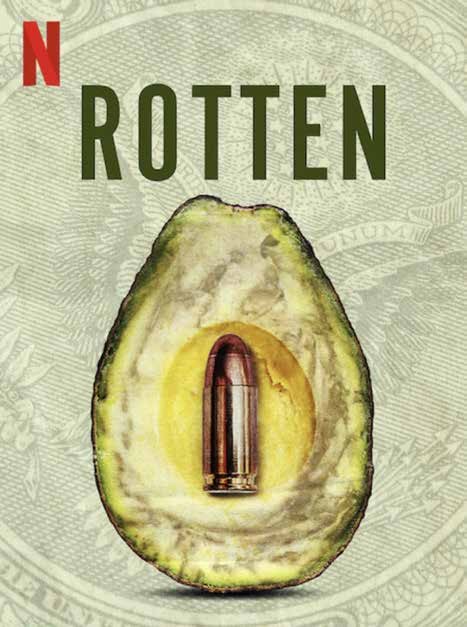FOOD ON FILM
Have you seen Rotten? This Netflix documentary series highlights current global food industry challenges.
Words Joel Dinsdale, vegetablesWA quality assurance coordinator

MY WA Grower article brief is to 'provide the latest information in the world of food safety and quality assurance'. To be different, however, I thought I’d get you to pick up your television remote or smart device and get bingeing. Bingeing is perhaps a COVID-19 habit (that has stuck), but it’s another tool we can use to learn and enhance our food businesses. So, pick up the remote and find your inner couch potato (for the record, I make no apology for the pun as it was absolutely intended!). My first suggested bingeing target is Netflix’s Rotten – here’s why…
In a world driven by consumption and convenience, it's easy to take the food on our plates for granted. However, Netflix's documentary series Rotten takes viewers on a journey into the underbelly of the global food industry. This thought-provoking series delves deep into various aspects of the food supply chain, exposing the ethical, economic and environmental challenges that lurk beneath our feasts.
The Rotten series (released in 2018) addresses some of the more pressing issues in the global food industry, demonstrating that the picture-perfect produce (fresh and grocery items) in your local supermarket may come with a hidden cost. Each episode focuses on a different aspect of the food production and distribution system.
One of the episodes, titled ‘The Perfect Cup’, delves into the booming global coffee industry, highlighting the stark disparity between the massive profits of coffee conglomerates and the plight of coffee farmers struggling to make ends meet. Sound familiar? The episode explores the challenges faced by coffee producers and ethical concerns related to the coffee trade. Viewers are left with a heightened awareness of the importance of supporting ethical and sustainable coffee production.
This is an example of why supply chains are looking to programs such as SEDEX and Fair Farms to get a third-party systems review conducted to confirm ethical sourcing/trading. Modern markets do not tolerate unethical trading activities and they must be controlled. The abovementioned systems become tools that can be used to provide a resolution.
Another episode, ‘Big Bird’, exposes the chicken industry's dark secrets, showcasing the drastic transformation from small-scale farming to the mass-production of chickens in America. It raises important questions about animal welfare, factory farming and the consequences of our desire for cheap, convenient food.
The episode titled ‘Garlic Breath’ takes viewers on a journey to China, the world's largest producer of garlic, and unravels a story of counterfeit garlic flooding international markets. This episode reveals the shocking extent of food fraud and the lack of transparency in the food supply chain. It underscores the need for consumers to be vigilant and for the industry to adopt rigorous standards to ensure the authenticity of food products. This is a real-world key reason why GFSI schemes (like Freshcare and SQF) have built in food defence and food fraud modules into their benchmarking requirements.
Throughout the series, Rotten underscores the role of politics, regulations and corporate interests in shaping the food industry. It sheds light on how powerful entities often dictate the rules, leading to adverse consequences for smaller producers, local communities and the environment. The series unearths the immense challenges faced by those who strive to bring sustainable and ethically produced food to our tables, highlighting the needs for programs that focus on ESG (Environmental, Social and Governance).
In addition to exposing the dark side of the food industry, Rotten also highlights potential solutions and efforts to create a more sustainable and equitable food system. By featuring individuals and organisations working to make a difference, the series inspires viewers to act and become more conscious consumers. It encourages consumers to consider the origins of our food and the impact our choices have on the world. And that is a good thing for all of us.
Rotten stands out as a muchwatch for our industry as its storytelling and thoughtprovoking narratives highlight the need for control (that customers ultimately request via food safety systems that create control and work to mitigate risks). It addresses the complexities of the food industry and tackles them head-on, compelling viewers to question their own role in the global food supply chain.

Rotten
is a Netflix Original TV show produced by Zero Point Zero. The show was originally broadcast on Netflix and premiered on January 5, 2018
“ Throughout the series, Rotten underscores the role of politics, regulations and corporate interests in shaping the food industry. ”
It's important to remember, however, that it represents a snapshot in time, and the food industry is constantly evolving. Nevertheless, it shines a much-needed spotlight on the multifaceted issues within the food industry that WA producers are not insulated from. The documentary perhaps provides context and justification for food safety systems and regulations as tools to protect consumers from ‘Rotten’ actions that might otherwise be lost in the supply chain. If you haven’t already watched it, Rotten is worth a look in your down-time. There are key learnings that you can take back to and apply to your business if you think critically and contextually about the content.
MORE INFORMATION
If you’ve watched Rotten and you’d like to discuss or you are chasing further support, please reach out to me at joel. dinsdale@vegetableswa.com.au.